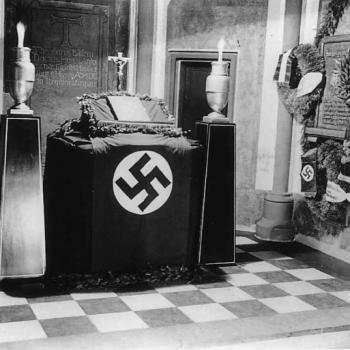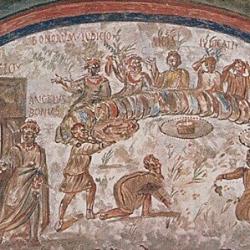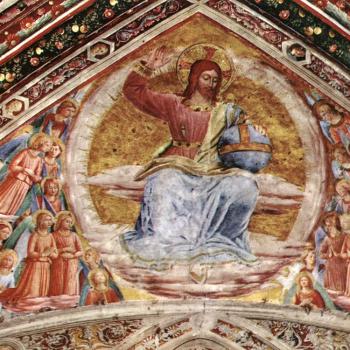
Loving someone, helping them to survive, even if we know that with such help, they might not be up to some good, does not mean we are supporting them in whatever bad they should do. After all, it is exactly what loving parents do for their children, so that, even if they know their children are criminals, even if they know all the bad things their children have done, or might do in the future, they still give their children love and support, hoping that by doing so, they can turn their children’s live around. It should be obvious that such love does not make them criminals (obviously, so long as what they do does not violate the law). Similarly, we are not sinners if we, out of love for others, care for them and help them, even if, by doing so, we might give them the means to make choices we would rather they did not make. For by our love, we hope that they will be drawn in and embrace that love for themselves and turn away from whatever evil they should be tempted to do. Thus, there is a big difference between supporting someone, out of love, and supporting or promoting evil, even if, by helping someone, we give them the means by which they can choose to do some evil. If this were not the case, then God, by giving us freedom, would be seen to be supporting evil, which of course, God does not do. This is also why Paul is able to say Christ is not an agent of sin, despite the way Christ works for us and our good, even if and when we are sinners. “But if, in our endeavor to be justified in Christ, we ourselves were found to be sinners, is Christ then an agent of sin? Certainly not!” (Gal. 2:17 RSV).
By forgiving us our sins, by giving us grace, by healing us from the wounds of sin, and then giving us freedom to make decisions for ourselves afterward, Christ must not be seen as if he supports sin. He does not. What he supports is us. His love for us is so great, he is willing to forgive us whenever we shall come to him, seeking his forgiveness. But he does much more than that. He gives us the grace which we need to do better, but only if we accept that grace and cooperate with it. Forgiveness is necessary if we are to be freed from the bondage of sin, and so granting us that forgiveness, Christ is not promoting sin, even if it means we are free to sin again. For, it should be clear, his ultimate aim is to eliminate sin from our lives. If he were unwilling to help us once we have sinned, there would be no end to our bondage to sin, and so sin would not come to an end. It is his loving support for us, despite our sin, which allows sin to be conquered, showing us that his victory over sin is found in and through the way he loves us and supports us with his love.
It is true that by forgiving us, giving us freedom to determine what we should do after we receive such forgiveness, Christ gives us room to sin again. But if we confuse this, thinking that because Christ gives us the opportunity to sin after we are forgiven, he ends up supporting sin, we do not understand sin nor the way it should be overcome. By being willing to welcome us back and forgive us each time we sin, Christ is working in and with us, giving us opportunity after opportunity to receive grace, and through that grace, to fight against sin and eliminate it from our own lives. That is, each time we turn to him for forgiveness, we receive what we need to finally overcome sin in our lives, and in this way, to share in Christ’s victory over sin (and death).
To truly experience Christ’s victory over sin, we must cooperate with him, cooperate with the grace which gives us, until, at last, its work can be seen in us in the way it transforms us and our lives. This is why, like Paul, we must point out how Christ’s way does not end in support of sin, but its elimination, for it works to make us better, greater, more loving, and indeed, more like Christ himself, something which would not be possible if Christ did not gives us our own subjectivity and our own ability to determine how we should act after receiving his grace. The more, then, we receive grace, the more we cooperate with it, we will be able to say, like Paul, “I have been crucified with Christ; it is no longer I who live, but Christ who lives in me; and the life I now live in the flesh I live by faith in the Son of God, who loved me and gave himself for me” (Gal. 2:20 RSV). The way to overcome sin is by the way of love, the way of the cross, and not by the logic of power, the logic which comes out of sin itself..
Therefore, for our full spiritual healing, we must not just cooperate with grace, but find a way to join ourselves and be one with him. And when we truly become one with him, then the Spirit of Christ will dwell in us, giving us access to the great, incomprehensible glory of the kingdom of God. Then Christ will be seen active in and through u, and by acting through us, the work of the incarnation will continue in history. But, to be sure, the more we cooperate with Christ, the more we let grace transform us, the more we let the work of the incarnation continue to work through us, the more we will find ourselves following the path of Christ, which means, we will be taking on and accepting the way of the cross:
If any man would come after me, let him deny himself and take up his cross and follow me. For whoever would save his life will lose it; and whoever loses his life for my sake and the gospel’s will save it (Mk. 8:34-35 RSV).
All who are saved will eventually follow this path, whether it is in their temporal existence, or in their experience after death; they will find themselves embracing the cross, allowing themselves to be crucified with Christ, so that like Paul, they will be able to say all that was born out of sin has been cast aside and all that is left is what is found in union with Christ, which is eternal life with all its glory.
Stay in touch! Like A Little Bit of Nothing on Facebook.
If you liked what you read, please consider sharing it with your friends and family!

















